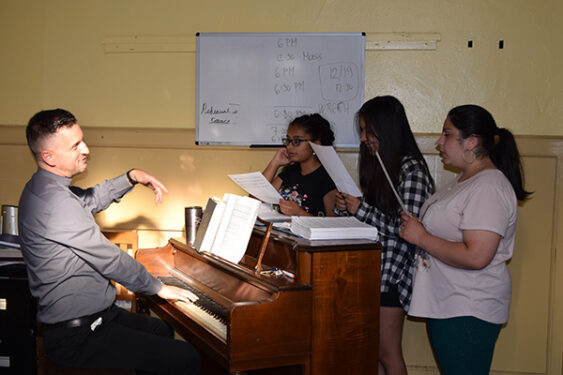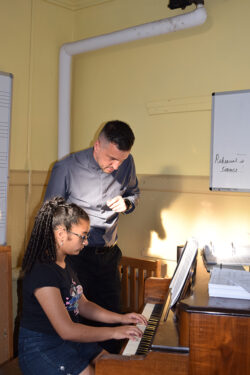
Father Saša Ilijić ‘s Busy Life as Parochial Vicar, Music Coordinator
ASTORIA — Father Saša Ilijić was playing the piano in a rehearsal room in the basement of Most Precious Blood Parish on a recent Friday evening, guiding three members of the parish’s Youth Choir through a new hymn.
“Good! Good!” he said encouragingly as the teenage singers tried to blend their voices together in harmony. But he couldn’t stay at the rehearsal for too long. He was already late for another rehearsal elsewhere in the building — the Hispanic Children’s Choir.
Father Ilijić, 41, who has been at Most Precious Blood for two years, is used to running from one place to another and juggling several tasks simultaneously. It’s his life these days.
In addition to his role as parochial vicar for Most Precious Blood Parish in Astoria, he is also the music coordinator. He enjoys both roles because he sees each as a way to bring people closer to God.
“It is what I am here for,” he said.
As parochial vicar, his job is to assist Father Vedran Kirinčić, the parish administrator (and a fellow Croatian), in ministering to the faithful at Masses, weddings, baptisms, and other sacraments.
His music coordinator job involves overseeing the music for special celebrations such as the parish’s 100th Anniversary Mass, which took place on the Feast of Corpus Christi on June 19.
He painstakingly selected the hymns — including a soaring version of “Adoro Te Devote” sung during Communion — and worked closely with the music directors and the directors of the parish choirs to make sure that everything came together for the Mass.
If you don’t think all that sounds hard, consider this — Most Precious Blood has 11 different choirs.
The parishioners include Croatians, Filipinos, and Latinos, as well as congregants born in the U.S. Each ethnic community has its own teen and adult choir, and some have children’s choirs as well.
“The people of this parish love to sing,” Father Ilijić said with a smile. It always delights him when the everyday parishioners sitting in the pews sing along with the choirs at Masses.
Father Ilijić works to ensure that the various ethnic music ministries are not limited to their own languages.
“When there’s a multi-lingual Mass, I want to see Filipinos singing Croatian, English-speaking people singing Tagalog,” he explained. “That is my concept of putting together a multilingual celebration.”
Alexander Lateo and Ycelsa Marmol, the co-directors of the Hispanic choirs, love working with Father Ilijić.
“He knows so much about music, so when you suggest doing something, you do not have to explain your meaning,” Lateo said.
“He is wonderful with the children, especially!” Marmol said. “When he is doing his homily at Mass, he sits right there with the children,”

Father Ilijić is perhaps the perfect person for the job of music coordinator. He holds a Ph.D. in musicology from the Academy of Music of the University of Ljubljana in Slovenia. While he was attending seminary in Rome, he served as assistant to the master of ceremonies at St. Peter’s Basilica, helping to direct the choirs.
He was ordained 16 years ago and serves the Diocese of Krk, where he grew up. Krk is an island off the coast of Croatia. He arrived at Most Precious Blood in 2020. Technically, he is on loan from the Diocese of Krk while he serves here in the Diocese of Brooklyn.
He hails from a musical family and began piano lessons at age four. Music was all around him. His grandmother Ivana Ilijic played the accordion and his grandfather Nicholas was an accomplished jazz saxophonist.
“And my parents could sing beautifully,” he recalled.
His father, Vojko, and his mom, Jelka, encouraged their children’s musical pursuits. They purchased the piano when he was four so he could begin lessons. His sister Katarina plays the guitar.
While he enjoys music, Father Ilijić quickly points out that Mass isn’t a performance.
“I know that sometimes when the choir finishes singing, the people will applaud,” he said, explaining that clapping takes away from why people are in church. “I don’t really like that.”
He also likes to remind choir members that they are also expected to participate in the Mass — including reciting prayers and kneeling — “because they are there to worship, too.”
